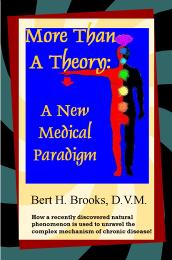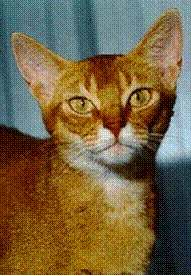





|
$24.95 + S&H for Single books.
20% Discount + S&H with orders of 5 books or more.
30% Discount + S&H with orders of 10 books or more.
Please have Credit Card Handy. We accept Visa, MC & Discover. CA Residents add 8.25% Tax.
OR Call us at: 877-843-6790 or 530-666-7322 |


|
Special interest in chronic or unresolved conditions. |

|
Phone: 530-666-7322 Fax: 530-666-7430 Remote Testing: 530-666-7300 Email: holisticvet@hughes.net |
|
To contact us: |
|
Please bookmark this page so you can return to it easily. |

|
Case Report #2 - Dorado —Chronic Stomatitis |

|
Summary: Dorado’s condition (diagnosed elsewhere as “ulcerative stomatitis”) is considered to have unknown etiology and a poor prognosis. Removal of all teeth is considered to be an effective allopathic treatment. In Dorado’s case, the condition was cleared in six months by identifying and eliminating his viruses and then his chemicals. We believe his therapy was discontinued too soon, but his owner insisted that his symptoms were gone and they were satisfied. |
|
History/Discussion: When another patient’s treatments proved successful, his owners decided to bring us Dorado to see if we might be able to help with his ulcerative stomatitis which is generally considered to be hopelessly “incurable” by conventional practitioners. The condition is usually first recognized because patients refuse to eat, though they appear hungry. (The ulcers which usually form in the corners of the mouth and around the gums involving the teeth, gums and oropharynx and are very painful.) The conventional approach is to begin with antibiotic therapy. When antibiotics lose their effectiveness, steroid therapy usually brings about temporary relief from the associated pain. Finally, the steroid fails to provide analgesia, and the patient is usually put to sleep. An extreme therapy of removing all teeth has been reported to help save some patients. Using ETA, we have found that every case of feline ulcerative stomatitis has been the result of viral infection accompanied by chemical accumulation. The infection/chemical accumulation is usually accompanied/exacerbated by allergies to the viruses and/or chemicals. |
|
After clearing his chemicals, Dorado is almost normal. Allergies have been found when we re-check him, but the owners are unwilling to clear allergies on a regular basis (cost) and are satisfied to live with the asymptomatic status quo. November 23, 2006: Infrequent testing continues. Dorado continues to do well. No more inflammation of gums. |
|
Date |
Findings |
ETA |
NAET |
|
7/3/02 |
Upon presentation, Dorado was afraid to leave his crate for examination. His owners reported that he was reluctant to eat and that they commonly observe “bloody drool” near his food dish. Dorado’s mouth was very sensitive and he resisted opening his jaw to permit oral examination. Intense inflammation was observed at the articulation of the mandible with the maxilla. Erythema extended into the oropharynx. |
ETA revealed the presence of four common and severe feline viruses (FIP, FeLV, FIV, Feline Calicivirus) which affected the liver, spleen, thymus, adrenals, skin, large bowel, mouth and gums. Dorado’s owner was having success with another patient’s e-Capsules and decided to use the same therapy for Dorado since it was difficult to get him to take anything orally because of the pain that eating caused. |
Dorado was allergic to his own oral mucous membranes!
|
|
7/22/02 |
Dorado’s owner reported today (approximately three weeks after starting e-Capsules) by e-mail: |
“The good news is that Dorado obviously is feeling much better, he’s noticeably more affectionate and playful!” |
|
|
8/7/02 |
“We notice a big improvement. No more bloody drooling.” Dorado’s owners reported that they noticed a real improvement in his attitude and eating behavior. |
ETA revealed that one of the viruses had been eliminated, three viruses remained. |
∅ |
|
9/11/02 |
Owners stated that Dorado was “Eating real well. No more weepy eye or blood in the mouth.” Examination of the oropharynx revealed: “stomatitis minimal but persists.” |
Two viruses were found to be present by ETA. |
|
|
10/18/02 |
Owners were very happy. “No pain in mouth, nor bloody drool. Doing real well.” |
NO Virus. Parotid Reflex reveals 5 agricultural chemicals which scan to Parotid, Liver, Gallbladder, Skin Oropharynx. |
|
|
11/20/02 |
Owners report: “Occasional drops of blood near food dish (eats only kibble and has few teeth remaining.) More animated.” Gingivitis persists at corners of mouth. |
NO virus. Parotid Reflex (Three agricultural chemicals scan to Parotid, Liver, Gallbladder, Skin Oropharynx.) |
|
|
12/20/02 |
Owners report “Occasional blood drops in food dish, but otherwise doing great. Eyes weep occasionally.”. |
NO virus. NO Chemicals. Mechanical |
|
|
2/19/03 |
Owners report: “Still has a little redness in gum & weeps a little out of right eye, but better.” Oral inflamation much improved which traces to Parotid. |
(Chemical NOT in kits. Chemical = Dorado’s antiseptic). |
|
|
2/11/04 |
“Dorado lost a lower canine. Local vet says gums look real good. Soft stool with occasional fresh blood.” |
|
|
|
Date of Exam |
Patient |
Age |
Sex |
Breed |
Species |
|
July 3, 2002 |
Dorado |
01/98 |
♂ |
Abyssinian |
Feline |